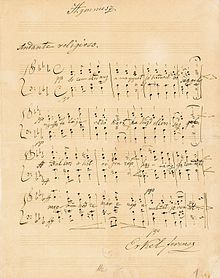Himnusz
This article needs additional citations for verification. (May 2011) |
| English: Hymn | |
|---|---|
 Original sheet music for Himnusz. | |
National anthem of Hungary | |
| Also known as | Isten, áldd meg a Magyart (English: God, bless the Hungarians) A magyar nép zivataros századaiból (English: From the stormy centuries of the Hungarian people) |
| Lyrics | Kölcsey Ferenc, 1845 |
| Music | Erkel Ferenc, 1845 |
| Adopted | 1845 (de facto) 1949 (by the Hungarian People's Republic) 1989 (de jure) |
| Audio sample | |
"Himnusz" (instrumental)
| |
"Himnusz" (Hymn; pronounced [ˈhimnus]) is the national anthem of Hungary.[1]
The lyrics were written by poet Ferenc Kölcsey in 1823, and its music was composed by romantic composer Ferenc Erkel in 1844. Originally a poem titled "A magyar nép zivataros századaiból" (From the stormy centuries of the Hungarian nation), it is often argued that this subtitle was added expressly to enable the poem to pass Habsburg censorship.[citation needed] It was the de facto national anthem of the Kingdom of Hungary in 1844, and was officially adopted as national anthem of the Third Hungarian Republic in 1989.
The lyrics of "Himnusz" are a prayer beginning with the words "Isten, áldd meg a magyart" (![]() listen (help·info); "God, bless the Hungarians").
listen (help·info); "God, bless the Hungarians").
History[]
Although Kölcsey completed the poem on 22 January 1823, it was only published first in 1829 in Károly Kisfaludy's "Aurora", without the subtitle, despite it being part of the manuscript. It subsequently appeared in a collection of Kölcsey's works in 1832, this time with the subtitle.[2] A competition for composers to make the poem suitable to be sung by the public was staged in 1844 and won by Erkel's entry. His version was first performed in the National Theatre in July 1844, then in front of a larger audience on 10 August 1844 at the inaugural voyage of the steamship Széchenyi. By the end of the 1850s, it became customary to sing "Himnusz" at special occasions either alongside Vörösmarty's Szózat or on its own.[2]
In the early 1900s, various members of the Hungarian Parliament proposed making the status of Himnusz as the national anthem of Hungary within Austria-Hungary official, but their efforts never got enough traction for such a law to be passed.[3] Later, in the 1950s, Rákosi made plans to have the anthem replaced by one more suited to the Communist ideology, but the poet and composer he had in mind for the task, Illyés and Kodály, both refused.[4] It wasn't until 1989 that Erkel's musical adaptation of Himnusz finally gained official recognition as Hungary's national anthem, by being mentioned as such in the Constitution of Hungary.[2][3]
Official uses[]
The public radio station Kossuth Rádió plays "Himnusz" at ten minutes past midnight each day at the close of transmissions in the AM band, as do the state TV channels at the end of the day's broadcasts. "Himnusz" is also traditionally played on Hungarian television at the stroke of midnight on New Year's Eve.[citation needed]
Alternate anthems[]
This section does not cite any sources. (July 2021) |
"Szózat" (Appeal), which begings with the words "Hazádnak rendületlenül légy híve, óh magyar" (To your homeland be faithful steadfastly, O Hungarian) enjoys a social status nearly equal to that of "Himnusz", even though only "Himnusz" is mentioned in the Constitution of Hungary. Traditionally, "Himnusz" is sung at the beginning of ceremonies, and "Szózat" at the end.
Recognition is also given to the "Rákóczi March", a short wordless piece which is often used on state military occasions; and the poem "Nemzeti dal" written by Sándor Petőfi.
Another popular song is the "Székely Himnusz", an unofficial ethnic anthem of the Hungarian-speaking Szekler living in Eastern Transylvania and the Székely Land.
Lyrics[]
The first stanza is officially sung at ceremonies.
| Hungarian lyrics (Ferenc Kölcsey, 1823) |
English translation (William N. Loew, 1881) |
IPA transcription |
|---|---|---|
Isten, áldd meg a magyart |
O, my God, the Magyar bless |
[ˈiʃtɛn aːld mɛg ɒ ˈmɒɟɒrt] |
Himnusz sculpture[]
This section does not cite any sources. (July 2021) |


On May 7, 2006, a sculpture was inaugurated for Himnusz at Szarvas Square, Budakeszi, a small town close to Budapest. It was created by , an artist with the Hungarian Heritage Award, depicting the full text of the poem in a circle, centered around a two metres high bronze figure of God, with 21 bronze bells in seven arches between eight pieces of stone, each four and a half metres high. The musical form of the poem can be played on the bells. The cost of its construction, 40 million forints (roughly 200,000 USD), was collected through public subscription.
References[]
- ^ "The Story Behind the Hungarian National Anthem". Jules S. Vállay. Retrieved 8 May 2017.
- ^ Jump up to: a b c "A Himnusz története" [History of Himnusz] (in Hungarian). Retrieved 2016-05-17.
- ^ Jump up to: a b "A Himnusz ügye az Országgyűlés előtt" [The matter of the anthem before Parliament] (in Hungarian). Retrieved 2016-05-17.
- ^ "Betiltották a Himnuszt" [Himnusz banned] (in Hungarian). Retrieved 2016-05-17.
External links[]
| Wikimedia Commons has media related to Himnusz. |
| Look up himnusz in Wiktionary, the free dictionary. |
- Hungarian anthem (video subtitled in 33 languages)
- Hungary: Himnusz - Audio of the national anthem of Hungary, with information and lyrics
- National and historical symbols of Hungary has a page about the anthem, featuring a vocal sound file.
- Sheet Music is available at the Hungarian Electronic Library website.
- Hungarian Anthem on Music Keyboard 2.4
- 1823 poems
- 1844 compositions
- 1844 songs
- European anthems
- Hungarian culture
- Hungarian patriotic songs
- National anthems
- National symbols of Hungary
- National anthem compositions in E-flat major